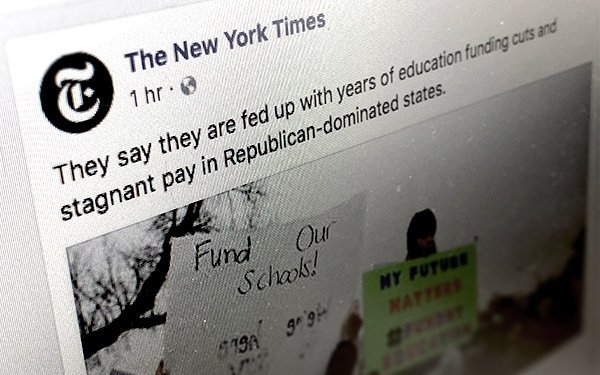News Organizations Seek Exemption From Facebook Political Ad Labeling
- by Wendy Davis @wendyndavis, June 11, 2018

Facebook should exempt posts by professional journalists from a new policy that has resulted in tagging works of journalism with a political ad label, a coalition of organizations representing media companies said Monday.
"Placing news ads in an archive designed to capture political advertising implies that Facebook considers there is a political agenda behind journalism," the News Media Alliance, Digital Content Next, American Society of News Editors and other groups write in a letter to Facebook CEO Mark Zuckerberg. "We see your policy as another step toward furthering a false and dangerous narrative that blurs the lines between real reporting from the professional media and propaganda."
The groups are responding to Facebook's recent decision to require labeling of political ads that refer to candidates, as well as "issue" ads, in an effort to combat foreign interference in elections. Facebook will also maintain an archive of all posts labeled as political ads.
The policy was largely driven by concerns over what happened during the 2016 presidential election, when Russian operatives purchased ads on the social network. Facebook began implementing the new ad rules late last month. Facebook has applied that policy to news organizations that pay to promote articles in people's news feeds.
Last week, the News Media Alliance -- which counts The New York Times, The Washington Post and Dow Jones among its nearly 2,000 members -- protested the policy to Congress.
Monday, the News Media Alliance and six other organizations argued that their members' reputations could be harmed by Facebook's new labeling policies. "Our marketing must reflect our journalism and tell the story of what it takes to produce credible, source-reported, quality news," the groups write. "We cannot and will not engage in any process that conflates legitimate newsgathering with politics or advocacy."
The groups are urging Facebook to "retrofit its original policy," by excluding works of journalism. The organizations suggest that Facebook could determine which organizations to exempt from its policy by examining factors like whether the organizations have an editorial staff and are commercially marketed. "The criteria for getting exempted could also include looking at audience size, and membership in accepted industry associations that represent a broad spectrum of publishers," the groups say.



Again we see the fallacy that journalism is somehow neutral and without bias. Reporters choose the framing of facts and cherry-pick sources to complete the narrative. Just because most journalists do an even-handed job does not ensure that all do the same. It's why "pack journalism" has long been an issue. https://en.wikipedia.org/wiki/Pack_journalism